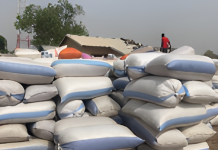By Amie Sanneh
The Ministry of Health and Social Welfare, through the Directorate of Health Promotion, yesterday gathered journalists to brief  them on the Zika virus which is now in the sub-region.
them on the Zika virus which is now in the sub-region.
Health Communication Officer, Mass Joo,f giving background information of the Zika virus, described it as a disease of public health importance. He said the virus not seen in the country does not mean that they should relent in their effort.
He explains that the Zika virus is an emerging mosquito-borne virus named after Zika Forest. He said the Aedes mosquitoes transmits the Zika virus and usually bites during the morning and late afternoon and evening hours, adding that sexual transmission of Zika virus has been described in 2 cases, and the presence of the Zika virus in semen in 1 additional case.
The symptoms of the virus, he said, are similar to other arbovirus infections such as dengue, fever, skin rashes, conjunctivitis, muscle and joint pain, malaise, and headache.
These symptoms, according to him, are usually mild and last for 2-7 days and they very rarely die of Zika. He added that once a person has been infected, he or she is likely to be protected from future infections.
On the prevention and control of the virus, Joof stressed the need for the removal and modification of breeding sites and reduce contact between mosquitoes and people.
He urged people to be using mosquito nets during the day if possible and at night.
He also called on communities to support the efforts of the local government to reduce the density of mosquitoes in their locality.
Joof highlighted some of the activities carried out by WHO in helping countries control the virus such as Strengthening the capacity of laboratories to detect the virus.
Senior Program Officer, Health Promotion Directorate, Dembo Fatty, said the health ministry has been organizing such briefings with journalists to ensure the public get the information at the right time. “As far as emergency response is concern, health is always at the forefront especially when it comes to information dissemination,” he said. Fatty explains that since the Zika virus was detected in the U.S. in October 2015, and the disease has no boundary in the globalized world, the health ministry deemed it necessary to sensitize the public. According to him, since it started, the country has no recorded case of the virus but noted that it is important to sensitise the public on the virus. “Gambia is free but should strengthen awareness creation at all levels. As far as the ministry of health is concerned, there is no single virus reported,” Fatty noted. He therefore urged journalists to report accurately noting that misinformation could be catastrophe.
Rohey Njie from the Health Promotion who chaired the briefing said the Zika virus is not in the Gambia but is seen in the sub region but was quick to add that they are always on the alert to strengthen their state of preparedness. She noted that disease has no boundary and people are travelling in and out everyday. This is why she said WHO is supporting countries to control the virus.
Zika virus she recalled was seen in Uganda in 1947 in monkeys and in 1952 it was seen in humans and it is transmitted by the Aedes mosquito. She said it was later seen in America, Asia, and the Pacific and also cases were reported in Africa.
Deputising the President of the Association of Health Journalists (AOHJ), former President Pa Modou Faal described the directorate of health promotion and AOHJ as good partners. He added that journalists are important partners when it comes to sensitization especially on emerging diseases such as the Zika virus. Faal stressed the need for the general public to be sensitized on the signs, symptoms and preventive measures on the disease. He finally called on his colleagues to engage health workers to enable them get accurate information noting that misinformation can send a wrong signal.





















